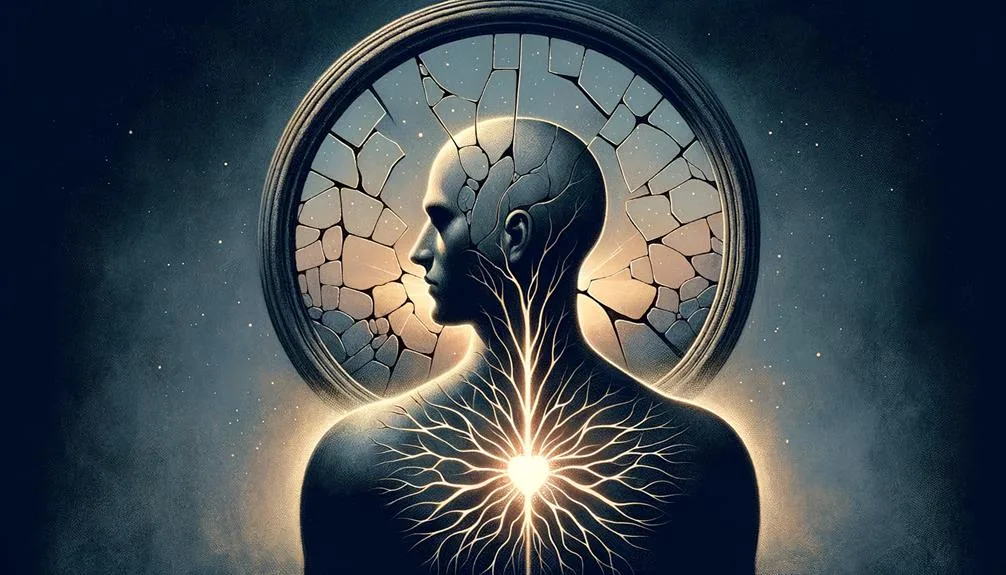You might think that self-loathing is an inescapable part of who you are, but it's not an indelible mark on your character. You've wrestled with the discomforting thought that you're your own worst enemy, yet there's a path to reconciliation with the person in the mirror.
'Discover the Dark Side Within: Healing Self-Loathing' guides you through understanding the roots of this inner conflict, enabling you to identify and dismantle the patterns that perpetuate self-hatred.
As you learn to replace self-destructive habits with compassionate self-care, you'll find the tools to construct a more forgiving and affirming relationship with yourself.
It's time to confront the harsh critic within, and while the journey may be challenging, the transformation awaiting you is liberating. Join us as we embark on this crucial quest for self-acceptance; the first step starts with acknowledging the issue at hand.
Key Takeaways
- Self-loathing is often based on a misunderstanding and can manifest through harsh self-talk, depression, anxiety, chronic insecurity, and neglect of one's body and health.
- Self-destructive behaviors such as self-sabotage, anger issues, refusing compliments or help, self-isolation, and addictions can be signs of self-loathing.
- The martyr complex and victim mentality are common in individuals struggling with self-loathing, leading to defeatist mindsets, hopelessness, and aimlessness.
- Self-loathing can be a part of the dark night of the soul, causing feelings of abandonment, inner emptiness, existential questions, and disconnection from one's true nature and life purpose.
Understanding Self-Loathing
Self-loathing, the harsh inner critic that constantly undermines your worth, is often rooted in a fundamental misunderstanding of your true self. This relentless negativity can stem from various causes and carry severe consequences, impacting your mental and emotional well-being.
It's essential to dissect the underlying reasons for your self-directed hostility, which may include past traumas, societal pressures, or personal failures.
You're not alone in this struggle, and seeking professional help can be a transformative step towards healing. Mental health professionals are equipped to guide you through the complexities of self-loathing, offering strategies to counteract its toxic effects.
Recognizing Self-Destructive Behaviors

While understanding the roots of your inner critic is crucial, it's equally important to recognize when this negativity manifests as self-destructive behaviors that can further undermine your well-being. Identifying triggers is a key step in this process, as it allows you to become aware of patterns and situations that exacerbate self-loathing. Seeking professional help can provide you with the tools to address these behaviors constructively. The table below outlines common self-destructive behaviors, potential triggers, and strategies for change:
| Behavior | Trigger | Strategy for Change |
|---|---|---|
| Self-sabotage | Fear of success | Set small, achievable goals |
| Refusing help | Low self-worth | Practice accepting assistance |
| Self-isolation | Social anxiety | Gradually increase social contact |
Embrace these strategies with compassion and patience; change takes time and effort.
Exploring the Martyr Complex

Exploring the martyr complex requires understanding how this self-sacrificial mindset can be a manifestation of underlying self-loathing, often leading individuals to neglect their own needs in favor of others'. Delving into the root causes of martyr complex, you recognize it may stem from childhood experiences, cultural influences, or personal insecurities.
This pattern of behavior, while seemingly altruistic, can create a toxic dynamic in relationships. It's important to discern that your worth isn't tied to the sacrifices you make for others.
The impact of martyr complex on relationships can be profound. It often breeds resentment and imbalance, as constant self-denial isn't sustainable or healthy. By addressing these issues, you pave the way for more equitable and fulfilling connections, both with yourself and those around you.
Overcoming Self-Loathing

Acknowledging the depths of your self-loathing marks the pivotal first step toward reclaiming your self-worth and initiating the journey to healing. Begin by nurturing self compassion and self forgiveness; these are crucial for moving past the pain. It's not about excusing past actions or negating feelings, but rather understanding and accepting them as part of your human experience.
Cultivating self acceptance:
- Recognize and challenge negative self-talk.
- Celebrate your unique qualities and embrace your imperfections.
Developing these areas involves consistent practice and patience. You're not alone in this struggle, and it's okay to reach out for support when the journey feels overwhelming. Remember, each small step you take is a leap towards a kinder relationship with yourself.
Building Self-Esteem and Worth

Building self-esteem and self-worth is essential, as these inner strengths serve as the foundation for a healthy, fulfilling life. It's about practicing self-compassion, not berating yourself for past mistakes or perceived shortcomings. This means treating yourself with the same kindness you'd offer a close friend.
Cultivating self-acceptance is also crucial. Analyze your self-talk and challenge negative beliefs by affirming your intrinsic value.
Frequently Asked Questions
How Does Chronic Self-Loathing Impact Long-Term Relationships and Intimacy With Others?
Chronic self-loathing creates trust barriers, leading you to emotional isolation. It hinders intimacy, as you may doubt others' affections and withdraw, fearing judgment or rejection in long-term relationships.
Can Self-Loathing Manifest Physically, and if So, What Are the Potential Health Consequences?
You may notice headaches or fatigue—these are psychosomatic symptoms where self-loathing takes a toll on your body. Chronic stress disorders can arise, impacting your overall health and well-being. It's essential to address this.
Are There Specific Cultural or Societal Factors That Contribute to the Development of Self-Loathing in Individuals?
Cultural perfectionism and media stereotypes can fuel your self-loathing, making you feel inadequate compared to unrealistic standards, and contributing to a cycle of negative self-perception and personal discontent.
How Does Self-Loathing Differ Among Various Age Groups, Such as Adolescents Versus Adults?
You're exploring how self-loathing manifests differently across ages. Adolescents often grapple with identity, while adults may wield resilience against such feelings. Understanding these nuances aids in addressing the issue empathetically and professionally.
Is It Possible for Someone to Completely Eradicate Self-Loathing, or Is It a Lifelong Struggle That Requires Constant Management?
You can work towards eradicating self-loathing through cognitive restructuring and compassion exercises, but it often requires ongoing effort to manage negative self-perceptions and maintain a positive self-image.
Conclusion
You've peered into the abyss, haven't you? Now, as you stand on the precipice of change, know that the leap towards self-love isn't just possible—it's within reach.
You're not merely surviving; you're on the verge of thriving. Embrace this moment, the suspense of transformation palpable. Tomorrow's reflection will be kinder, the storm in your eyes calmer.
The journey is arduous, but remember, every step forward is a victory. You're about to turn the page.

